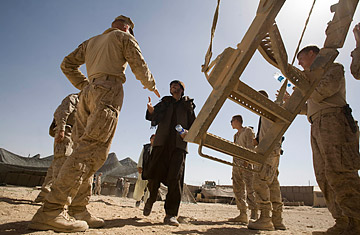
Marines Commander Lieut. Colonel Brian Christmas congratulates the first volunteers of the Marjah police force
(2 of 2)
The pressure is on. The Marines and the Afghan Interior Ministry have less than six months to assemble the troubled district's police force before losing the help of several hundred Afghan National Civil Order Police (ANCOP), whom the Afghan government sent to Marjah after the offensive. In November they'll move on to Kandahar to assist U.S. Army operations there. But a tenuous security situation and a persistent Taliban presence mean the Taliban still wield the power to intimidate Marjah's residents. And attacks across Afghanistan frequently target Afghan security forces. "A good portion of the Taliban are the locals. They've been fighting for 30 years," says Christmas. At this point, he adds, many of the local farmers remain on the fence, waiting to see which group controls the area before they decide whether to side with the Marines or the Taliban. "Everyone wants to join the police, but the problem is that the Taliban are one kilometer from here, and they will create problems for us," explains a villager not far from the Marines' base.
All but three of the new recruits say they're from the Ishaqzai tribe in northern Helmand, which has typically been pro-Taliban. On the one hand, their inclusion in the new force could factor strategically into the Marines' efforts, providing much-needed employment to a group that has long complained of marginalization and whose disenchantment has helped fuel the insurgency. On the other hand, the tribe's Taliban connections could be a liability. But Vasquez doesn't believe they will be a problem. Each recruit has the official backing of a tribal elder, a mechanism based on custom and accountability that he says will counter any possible Taliban allegiances. And the promised salary — 12,000 Afghanis a month (roughly $240), compared with the 9,000 Afghanis earned by police in other provinces, should add an additional incentive to do good work.
"I'm more concerned that they're going to get halfway through training and then there's going to be a problem back home that pulls their attention back here," says Vasquez. "Someone could be trying to intimidate their family. And we have a lot of guys who, for whatever reason, start the training and then something happens back home and they disappear."
The new force will also face the obstacle of overcoming a dismal police legacy. For years, rampant abuses by Afghan police in Helmand have fueled support for the Taliban and undermined efforts to build local governance. "There is a district governor and there are police here," says Mullah Musa Mohammed, a Marjah elder who attended a recent shura, or gathering of elders in the district center. "The problem is, they do not work well."
A month ago, Marines based at the Marjah district center discovered that the ANCOP forces stationed at their base were scamming Afghan civilians as they entered and left the base to pick up money for war-damage claims. They would charge people a fee to enter and then solicit a bribe from the damage money when they left, a Marine explained on condition of anonymity. Eventually, the Marines had to reposition themselves to monitor the police. "ANCOP take our supplies. We give them rations and they take them down to the bazaar and sell them. It's unbelievable," he added. "They go down the bazaar and shake people down because they have the authority ... The local nationals are scared to come to ANCOP, so they come to us — the Marines."
The pressure is also riding on Marjah's new recruits. "The next class is June 30, so we'll see how it goes," says Vasquez. "Everyone is going to be watching these 11." That afternoon, Vasquez and his team ushered the new recruits into the Marines' armored vehicles to transport them to Marjah's district center, en route to their training course in Lashkar Gah. As the truck door shut, Vasquez joked to his team, "Hurry! Seal them up before they change their minds!"
